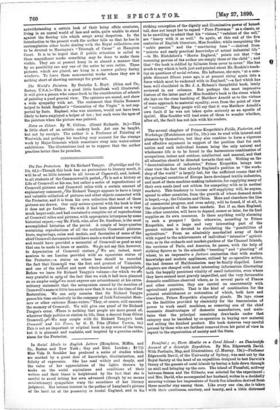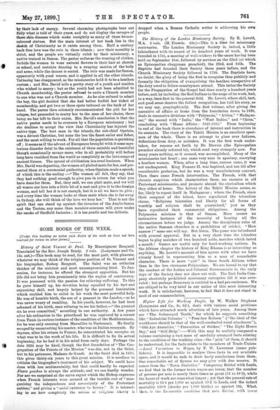.Funafuti; or, Three Months on a Coral Island : an
Unscientific Account of a Scientific Ezpedition. By Mrs. Edgeworth David. With Portraits, Map, and Illustrations. (J. Murray. 12s.)—Professor Edgeworth David, of the University of Sydney, was sent out by the Royal Society at the head of an expedition designed to test Darwin's theory of the genesis of coral islands by boring a hole down through an atoll and bringing up the core. The island of Funafuti, midway between Samos and the Gilberts, was selected for the experiment ; and Mrs. David, who accompanied her husband, writes in a decidedly amusing volume her impressions of South Sea islanders derived from three months' stay among them. Like every one else, she is taken with their ventleness. courtesy, and beauty, and a little distressed by their lack of energy. Several charming photographs bear out fully what is told of their grace, and do not display the ravages of those skin diseases which make unsightly so many of these bronze- coloured statues. But the main interest of her book lies in the sketch of Christianity as it exists among them. Half a century back free love was the rule in these islands ; now their morality is strict, and the people are virtually ruled by their missionary, a native trained in Samoa. The pastor enforces the wearing of clothes, forbids the women to wear natural flowers in their hair at church or school, and restricts dancing to a swaying motion of the body and arms, while the dancer is seated. The rule was made for Samoa, apparently with good reason, and is applied in all the other islands. Tattooing has disappeared, as the missionaries held it to be a heathen custom ; and Mrs. David tells a pretty story of a youth and maiden who wished to marry ; but as the youth had not been admitted to Church membership, the pastor refused to unite a Church member to one who was not a Church member. As he also refused to admit the boy, the girl decided that she had better forfeit her ticket of membership, and got two or three spots tattooed on the back of her hand. The pastor then solemnly excommunicated the girl for her relapse, but proceeded to marry her to the man of her choice, there being no bar left to their union. Mrs. David's conclusion is that the native pastor needs to be overseen by a European missionary ; but she declines to accept the view that Christianity has injured the native type. The best man in the islands, the sub-chief Opataia, was a devout Christian, but none the less the finest sailor and fisher, and the most willing to work. For all that the population is perishing off ; it seems as if the advent of Europeans brought with it some mys- terious disorder fatal to the existence of these amiable and beautiful though occasionally savage races, who in all probability will before long have vanished from the world as completely as the love-songs of ancient Greece. The spread of civilisation is a cruel business. When Mrs. David was departing, the women all plaited mats for her, and pre- sented them at a ceremonial gathering, when Opataia made a speech, of which this is the ending :—" The women all felt, they say, that they had nothing good enough to give you in return for what you have done for them. But, they said, we can plait mats, and we will all weave our love into a little bit of a mat and give it to the foreign woman, and tell her it is not enough, but it is all we have to give; and every time the woman looks at these mats when she is far away in Sydney, she will think of the love we bear her." That is not the spirit that can stand up against the invasion of the Anglo-Saxon and the Teuton, any more than meadow-crocuses will grow under the smoke of Sheffield factories ; it is too gentle and too delicate.







































 Previous page
Previous page